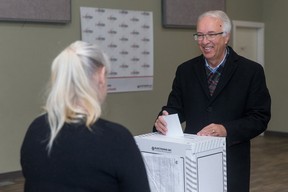TOP STORY
One of the side-effects of Prime Minister Justin Trudeau proroguing Parliament is that a whole bunch of contentious legislation might never see the light of day.
But Ottawa is still asking Canadians to pay up to $5 billion in new capital gains tax — even though the new tax hasn’t been encoded into Canadian law and may never be.
In a Wednesday statement, the Canadian Taxpayers Federation accused the Canada Revenue Agency of enforcing an “undemocratic” measure. “Taxation should only be based on laws duly passed by elected representatives and not assumptions by unelected, unaccountable bureaucrats,” said their general counsel, Devin Drover.
Dan Kelly, president of the Canadian Federation of Independent Businesses, described Canada as being stuck in a “ridiculous capital gains purgatory.”
In the last federal budget, then-finance minister Chrystia Freeland pledged to effectively hike Canadian capital gains taxes to one of the highest rates on earth.
A capital gain refers to the profit made by selling off an asset — such as a business or a building — at a higher rate than you paid for it. Buying a $1 million house and flipping it for $1.2 million, for instance, yields a capital gain of $200,000.
What Freeland pledged to do was to increase the share of capital gains that could be taxed, from 50 per cent to 66.67 per cent.
It immediately proved to be the most controversial plank of Freeland’s so-called “fairness” budget, with everyone from family doctors to tech entrepreneurs to former finance minister Bill Morneau warning of massive unintended consequences. According to one analysis by economist Jack Mintz, the tax hike risked spurring enough capital flight to impose a $90 billion hit to GDP.
Taxes are not increased via federal budgets, however, and are typically introduced through a two-step process.
First, the feds pass a “ways and means motion” warning of pending changes to tax law. And then, they table the requisite legislation to actually encode the change into law (in the case of the capital gains hike, they need to amend Canada’s 1985 Income Tax Act).
In the case of the capital gains hike, the Trudeau government only did the first step; they passed a ways and means motionin June with NDP and Bloc Québécois support. But they never got around to actually putting these changes into a House of Commons bill. And even if they had — it would have been killed by prorogation anyway.
In a Wednesday notice, the Canada Revenue Agency acknowledged that the capital gains hike is still “subject to parliamentary approval,” but that they would be collecting it anyway in keeping with “standard practice.”
This isn’t all that unusual; the Canada Revenue Agency makes a point of tweaking its forms and procedures at the moment a tax change is written into a ways and means motion.
“Any change in taxation is effective the moment a Minister tables a notice of a ways and means motion. The implementing legislation may only be adopted months (or years) later, but the taxes are collected from the date of the notice,” reads a 2011 analysis in the Canadian Parliamentary Review.
It’s called the “provisional implementation of taxation,” and it’s generally something that both accountants and tax collectors agree upon, as it smooths out the process of tax filing without requiring costly resubmissions and reassessments as a tax bill moves through Parliament.
But in the case of the capital gains hike, the Canada Revenue Agency is effectively planning to collect billions of dollars in unapproved taxes, only for the money to be refunded if the Trudeau government ends up going down to defeat and the next government quashes the changes.
In a write-up for Chartered Professional Accountants Canada, tax expert John Oakey said he’s seen prior instances of taxes being thrown into limbo by the machinations of the House of Commons, but never like this.
“This is not the first time Parliament has been prorogued or dissolved with outstanding tax measures unresolved, but this is the first time in my career that I have seen this volume,” wrote Oakey.
According to an analysis by the Parliamentary Budget Officer, the hike is expected to impose $5 billion in extra taxes this year — money that will all end up being refunded if the capital gains hike never ends up becoming law.
Although it’s not mandatory to pay capital gains taxes at the unapproved higher rate, taxpayers are currently faced with two bad options.
They can listen to the CRA and pay at the higher rate, only to have it refunded after Parliament dissolves.
Or, they can ignore the CRA and pay at the prior tax rate. “Such taxpayers would not be wrong in their decision to do so — the Capital Gains Legislation is, after all, not currently the law,” reads a recent guidance by the law firm Dentons.
However, if the Trudeau government survives long enough to pass the necessary amendments to the Income Tax Act, the non-payers would be hit with bills for unpaid taxes, all of it hit with the CRA’s famously high interest charge for late payments.
IN OTHER NEWS
After years of feverish increases, rents in Canada are starting to go down. A new report by Rentals.ca found that “asking rents” went down by three per cent in 2024. This comes after some utterly soaring rent increases in 2022 (12.1 per cent) and 2023 (8.6 per cent), so rents are still pretty unaffordable. Still, this represents a rare instance of Canadian shelter costs actually seeming to get cheaper. Rentals.ca doesn’t speculate as to why this is happening, but it could be a reflection of federal curbs to immigration. Immigration has been at historic highs ever since the end of the COVID-19 pandemic, adding as many as 3,200 newcomers per day into a rental market that was already drumtight. But in recent months, the Trudeau government has stopped renewing visas in the hopes that between two and five million temporary migrants will leave voluntarily.
-

The B.C. Conservative Party (whose leader, John Rustad, is pictured) is calling for an investigation into the 2024 B.C. election over alleged voting irregularities, such as non-citizens casting ballots or mail-in votes being harvested from confused seniors. The allegations are a particularly big deal because the 2024 B.C. provincial election was so close; the B.C. NDP obtained the absolute minimum number of seats to hold a majority, and multiple ridings were won by margins of fewer than 200 votes.
A CBC-commissioned poll finds that recent immigrants to Canada think that the country is bringing in too many immigrants. The poll, conducted by Pollara, surveyed people who had arrived in Canada within the last five years. While the vast majority reported liking it here, an incredible 82 per cent said the cost of living was too high, and 66 per cent said they would warn friends and family in their home country not to move here. This is almost the exact ratio of Canadians generally who said immigration is too high; an October survey by Leger found that 65 per cent of Canadians wanted immigration levels curbed. Pollara speculated that respondents felt “Canada has already accepted too many immigrants without enough infrastructure, housing, and job opportunities.”
-

Former Prime Minister Stephen Harper (pictured above with a former rival) appears to have weighed in on the hot topic of U.S. annexation: He doesn’t like it. In a social media post, Harper didn’t directly challenge the repeated threats by U.S. president-elect Donald Trump to make Canada a U.S. state. Rather, he posted a patriotic speech of his in which, among other things, he declares that “Canada is, and always has been, our country.”
Get all of these insights and more into your inbox by signing up for the First Reading newsletter here.

